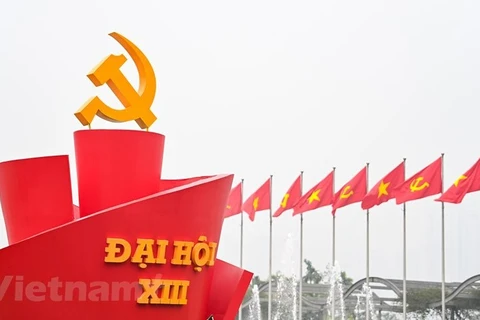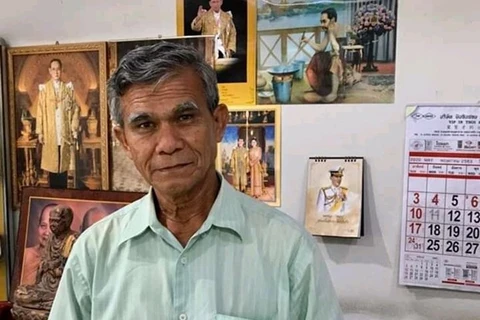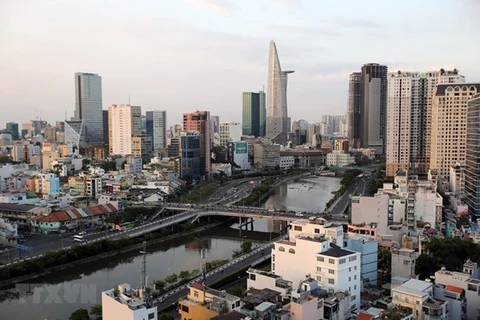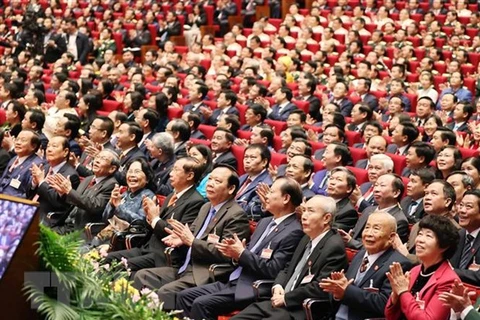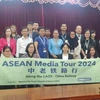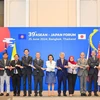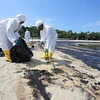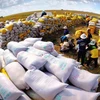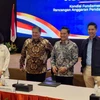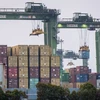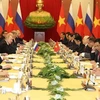Berlin (VNA) - Global media and foreign experts have expressed their high regard for Vietnam’s success in improving its prestige and touched on the major aspects of the 13th National Party Congress.
Professor Thomas Engelbert from the University of Hamburg and economist Daniel Muller from the German Asia-Pacific Business Association cited future-forward actions together with clear and consistent goals as a crucial factor in the success of the Communist Party of Vietnam.
They said the country’s greatest success is in the economic field. Beginning as a backwards agriculture-reliant nation, Vietnam has become an emerging market focusing on production and trade. The poverty rate has fallen significantly while average annual per capita income has improved considerably and progress has been seen in social indicators.
The economic achievements are attributable to Vietnam’s participation in the world market via free trade policies and welcoming foreign investors.
In the international arena, Vietnam’s stature in ASEAN has increasingly improved after its successful tenure as the ASEAN Chair in 2020. Vietnam has also become a promising partner of several Asian and Western countries in various fields, including the US and the EU.
Germany also wants to reinforce its strategic partnership with Vietnam in a practical manner.
The German scholars stressed that Vietnam’s success in the fight against COVID-19 has received attention around the world, contributing to improving its image, leadership’s prestige, and economic efficiency.
Forecasting Vietnam’s orientations in internal and external affairs, the scholars said that, in the short term, Vietnam will continue benefiting from economic activities that are almost undisrupted. They suggested tapping existing advantages to conduct necessary reform and modernisation policies, such as building a network of effective suppliers and improving the quality of products from domestic manufacturers.
They proposed that Vietnam facilitate digitalisation to become a high-tech destination, ease its reliance on foreign investors, and enhance the added value of businesses.
Vietnamese companies should receive support to tap trade agreements such as the EU-Vietnam Free Trade Agreement, they said, adding that infrastructure, energy supply, and the education landscape need to catch up with economic development.
Meanwhile, Singapore’s the Straits Times said that during the nine days of the National Party Congress, delegates will choose new leaders, and most analysts have predicted that Vietnam will continue with its existing economic, internal, and external policies.
The US’s Foreign Brief forecast that Vietnam will prioritise promoting sustainable growth by diversifying trade partners and improving domestic supply chains before framing its middle power strategy./.
Professor Thomas Engelbert from the University of Hamburg and economist Daniel Muller from the German Asia-Pacific Business Association cited future-forward actions together with clear and consistent goals as a crucial factor in the success of the Communist Party of Vietnam.
They said the country’s greatest success is in the economic field. Beginning as a backwards agriculture-reliant nation, Vietnam has become an emerging market focusing on production and trade. The poverty rate has fallen significantly while average annual per capita income has improved considerably and progress has been seen in social indicators.
The economic achievements are attributable to Vietnam’s participation in the world market via free trade policies and welcoming foreign investors.
In the international arena, Vietnam’s stature in ASEAN has increasingly improved after its successful tenure as the ASEAN Chair in 2020. Vietnam has also become a promising partner of several Asian and Western countries in various fields, including the US and the EU.
Germany also wants to reinforce its strategic partnership with Vietnam in a practical manner.
The German scholars stressed that Vietnam’s success in the fight against COVID-19 has received attention around the world, contributing to improving its image, leadership’s prestige, and economic efficiency.
Forecasting Vietnam’s orientations in internal and external affairs, the scholars said that, in the short term, Vietnam will continue benefiting from economic activities that are almost undisrupted. They suggested tapping existing advantages to conduct necessary reform and modernisation policies, such as building a network of effective suppliers and improving the quality of products from domestic manufacturers.
They proposed that Vietnam facilitate digitalisation to become a high-tech destination, ease its reliance on foreign investors, and enhance the added value of businesses.
Vietnamese companies should receive support to tap trade agreements such as the EU-Vietnam Free Trade Agreement, they said, adding that infrastructure, energy supply, and the education landscape need to catch up with economic development.
Meanwhile, Singapore’s the Straits Times said that during the nine days of the National Party Congress, delegates will choose new leaders, and most analysts have predicted that Vietnam will continue with its existing economic, internal, and external policies.
The US’s Foreign Brief forecast that Vietnam will prioritise promoting sustainable growth by diversifying trade partners and improving domestic supply chains before framing its middle power strategy./.
VNA

